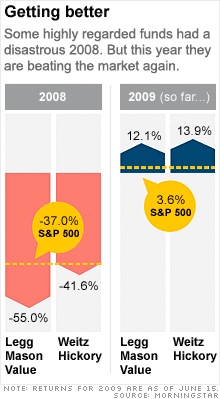Bill Miller bounces back
And so have some other famous stock pickers. Is it time to get back into their funds?

(Money Magazine) -- Last year it looked as if the era of the celebrity fund manager was finally, definitively over. The best and brightest had not only failed to avoid the financial meltdown but did worse than the market as a whole. Now some are staging a comeback.
Take Bill Miller of Legg Mason Value, knocked from his perch by a 55% loss in 2008. This year through June 15, Miller has gained 12.1%, vs. 3.6% for the S&P 500. Harry Lange's Fidelity Magellan, which fell 49.4%, is now up 16.6%. And Wally Weitz of Weitz Hickory, down 41.6%, rebounded 13.9%.
No, these short-term gains don't come close to making up for last year's losses. But if you pulled your money out of one of these marquee funds during the market collapse (as so many shell-shocked investors did), you may be feeling a few pangs of regret right now. And you're probably wondering whether it's time to jump back into one of these funds.
Here's a better question: Do you belong in any actively managed fund? Most of the evidence says that a stock picker is unlikely to beat a passively run index fund over time. And star fund managers tend to fade out or move on. Just look at Michael DiCarlo, Mark Holowesko, or Blaine Rollins. If those names don't ring a bell, trust me - they used to be famous.
When you look beyond the notion of market-beating returns, however, there still are some plausible reasons to opt for an active portfolio. Perhaps you want a manager who will minimize market volatility by buying only cash-rich, blue-chip stocks, or maybe you want someone who will aim for big gains by investing in tiny but fast-growing companies. In other words, you can use active funds to fine-tune your portfolio so that it fits with your taste for risk.
If you opt for the active approach, it's important to do it the right way.
Know the strategy. The main way funds outperform the market is to take more risks. That may mean holding a concentrated portfolio of stocks or making big bets on two or three industries. Either way, the fund is bound to perform differently from the overall market. If you can't handle that kind of risk, stick with funds that hold more broadly diversified portfolios instead. Or just buy a low-cost index fund.
Be patient. Even the best managers are likely to go through long periods of poor performance. A study last year by Baird Advisory Services found that top stock pickers often lagged comparable funds for three-year periods, while still ending up with above-average 10-year track records.
"Most managers will go through periods when they look stupid," says Baird's Timothy Byrne. To succeed with active funds, you have to have some tolerance for failure.
Know when to be impatient. When does it make sense to dump a fund? If the boss or a key member of the team leaves, you should consider moving on too. Finding really smart managers is hard enough - why take a chance on an unknown? ![]()


